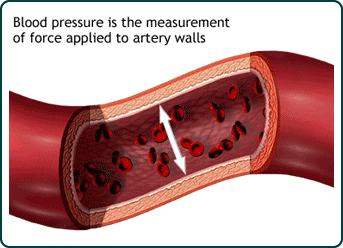
Blood pressure is the force of blood against artery walls as the heart pumps blood through the body. It’s normal for blood pressure to go up and down throughout the day, but if it stays up, you have high blood pressure. Another name for high blood pressure is hypertension.
When blood pressure is high, it starts to damage the blood vessels, heart, and kidneys. This can lead to heart attack, stroke, and other problems. High blood pressure is called a “silent killer,” because it doesn’t usually cause symptoms while it is causing this damage.
Your blood pressure consists of two numbers: systolic and diastolic. The top or “systolic” number measures blood pressure in the arteries when the heart beats and pumps blood out to the body. The bottom or “diastolic” number measures blood pressure in the arteries between heartbeats, when the heart muscle is refilling with blood.
Stages of blood pressure are as follows:
-
Healthy blood pressure is less than 120/80.
-
Prehypertension is a systolic pressure of 120 to 139 or a diastolic pressure of 80 to 89.
-
Stage-1 high blood pressure ranges from a systolic pressure of 140 to 159 or a diastolic pressure of 90 to 99.
-
Stage-2 high blood pressure is over 160/100.
What are the causes and/or risk of high blood pressure?
In most cases, doctors can’t point to the exact cause. But several things are known to raise blood pressure. The following are some common risk factors that often lead to high blood pressure:
- A diet high in salt, fat, and/or cholesterol
- Illnesses such as kidney problems, diabetes, and high cholesterol
- Family history of high blood pressure
- Inactive lifestyle
- Older age
- Overweight
- Birth control
- Stress
- Tobacco use
- Eccessive alcohol use
High blood pressure symptoms
High blood pressure usually does not cause symptoms. Most people don’t know they have it until they go to the doctor for another reason. If left untreated, high blood pressure can damage the heart, brain, kidneys, or eyes. This damage causes problems like coronary artery disease, stroke, and kidney failure.
If your blood pressure is extremely high, there may be certain symptoms to look out for, including:
- Severe headache
- Fatigue or confusion
- Vision problems
- Chest pain
- Difficulty breathing
- Irregular heartbeat
- Blood in the urine
- Pounding in your chest, neck, or ears
What is the treatment for high blood pressure?
Treatment of high blood pressure depends on how high your blood pressure is and whether you have other health problems such as diabetes, and whether any organs have already been damaged. Your Coastal Urgent Care doctor will also consider how likely you are to develop other diseases, especially heart disease.
You can help lower your blood pressure by making healthy changes in your lifestyle. If those lifestyle changes don’t correct it, you may also need to take medication.
Either way, you will need to control your high blood pressure throughout your life.
- If you have prehypertension, your doctor will likely recommend lifestyle changes. These may include losing extra weight, exercising, limiting alcohol, cutting back on salt, quitting smoking, and eating a low-fat diet that includes more fruits, vegetables, whole grains, and low-fat dairy foods.
- If you have high blood pressure without any organ damage or other risk factors for heart disease, your doctor may recommend that you take medicine in addition to making lifestyle changes.
- If you have high blood pressure and have some organ damage or other risk factors for heart disease, you may need to try various combinations of medicines in addition to making big lifestyle changes.
How can I help prevent high blood pressure?
The best prevention is to have a heart-healthy lifestyle.
-
Keep a healthy weight.
-
Eat a healthy diet.
-
Stay fit with the right kind of exercise for you.
-
Decrease stress.
-
Don’t smoke.
-
Limit your use of alcohol.
For more information about high blood pressure or if you want to get yourself checked out by a doctor – Contact your local Coastal Urgent Care today!
